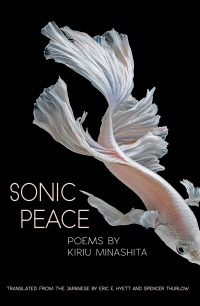September 10, 2018— The American Literary Translators Association (ALTA) is delighted to announce the 5-title shortlist for the 2018 Lucien Stryk Asian Translation Prize! Lucien Stryk was an internationally acclaimed translator of Japanese and Chinese Zen poetry, renowned Zen poet himself, and former professor of English at Northern Illinois University. The Lucien Stryk Asian Translation Prize recognizes the importance of Asian translation for international literature and promotes the translation of Asian works into English. This year’s judges are Robert Hueckstedt, Sora Kim-Russell, and Juliet Winters Carpenter.
The award-winning book and translator for 2018 will receive a $5,000 cash prize, and the award will be announced during ALTA’s annual conference, ALTA41: Performance, Props, and Platforms, held this year in Bloomington, IN from October 31 – November 3, 2018. If you can’t join us in person, follow our Twitter (@LitTranslate) and Facebook (www.facebook.com/literarytranslators) for the announcement of the winners!
The 2018 Lucien Stryk Shortlist (in alphabetical order by title):
 Darkening Mirror
Darkening Mirror
By by Wang Jiaxin
Translated from the Chinese by Diana Shi and George O’Connell
(Tebot Bach)
This brilliant translation, graced by a penetrating introduction by former U.S. Poet Laureate Robert Hass, introduces the work of a major contemporary poet. In poems written in a span of thirty years from 1985 to the recent present, Wang draws on the classical tradition of Du Fu and others with homage also to W.B. Yeats, Octavio Paz, and Emily Dickinson. Throughout, his voice remains intensely personal, fusing the lyrical and the intellectual as he explores memory and meaning. The reader encounters quiet meditations (“When I want to speak to you of truth, I find I must use / another language.”) and the beauty in aching silences (“Write winter to its last day. Time splinters: from the space / between words, smoky mist ascends, boundless, indistinct.”). As old age comes on, he has a special affinity for snow: “I love the snow, these shivering losses, remembering / the grass, its last green breath.” These are poems to savor and treasure.
Devils in Daylight
By Junichiro Tanizaki
Translated from the Japanese by J. Keith Vincent
(New Directions)
Though a mystery novella, Devils in Daylight is as literary as the work of Edgar Allan Poe, whose “Gold Bug” was a major inspiration. Appearing first in 1918, when “everyone” had read Poe’s short story, Devils in Daylight carries that story over into early twentieth-century Japan and then takes it much further than Poe could have imagined possible. The ending will surprise every reader. The translator uses a fluent English to help non-Japanese readers through the suspense, and his afterword fills in much that the English had no choice but to leave behind.
 The Maids
The Maids
By Junichiro Tanizaki
Translated from the Japanese by Michael P. Cronin
(New Directions)
From the 1930s through the first half of the 1960s the Chikura household employs many maids, some staying only a year or so, and a few staying longer than ten. Though a relatively short novel, The Maids illuminates from within the huge social changes that occurred during that time, reflected in the changing relationships between the maids and the members of the family. These relationships are shown with heartfelt precision, and the narration is enriched with many allusions, not only to the time of the setting but to earlier, classical Japanese literature. The translator handles all this masterfully, and his afterword should not be missed.
 Notes of a Crocodile
Notes of a Crocodile
By Qiu Miaojin
Translated from the Chinese by Bonnie Huie
(New York Review Books)
Notes of a Crocodile by Qiu Miaojin, first published in Taiwan in 1994, is a queer novel in both senses of the adjective. It tells the story of a “woman who loves women,” while also queering the conventions of the novel to chart a non-linear, non-binary, playfully fragmented, and multi-genre course of its own. Translator Bonnie Huie deftly navigates Qui’s stylistic twists and turn, artfully balancing ontological philosophy against the diction and hijinks of a group of college-aged misfits chafing against social expectations. While fundamentally a story about misfits—crocodiles who “adopted a homemade ‘human suit’ before running away from home”—it is a perfect fit and an overdue addition to the ever-growing body of queer literature from around the world.
 Sonic Peace
Sonic Peace
By Kiriu Minashita
Translated from the Japanese by Eric E. Hyett and Spencer Thurlow
(Phoneme Media)
This collection of poetry by Kiriu Minashita, awarded the Nakahara Chūya Prize, portrays modern Tokyo as a world of lonely, electronic artificiality. Vending machines glow, the sky rains scrap iron, “the strange digitized land dances.” People lose their names, their identities—“Morning on the train platform / someone has dropped a name / lonely and round.” Words themselves become plastic, unreal… communication a constant challenge. To underscore the difficulty, Minashita uses the katakana syllabary to “isolate sound from meaning.” The translators have cleverly approximated the effect in English by dividing words syllabically in dictionary form. And yet despite the problematic nature of language and communication in this disjointed world, meaningful connection is possible: “My words / be・come words / as they’re un・der・stood by you—” Hope outweighs despair.
